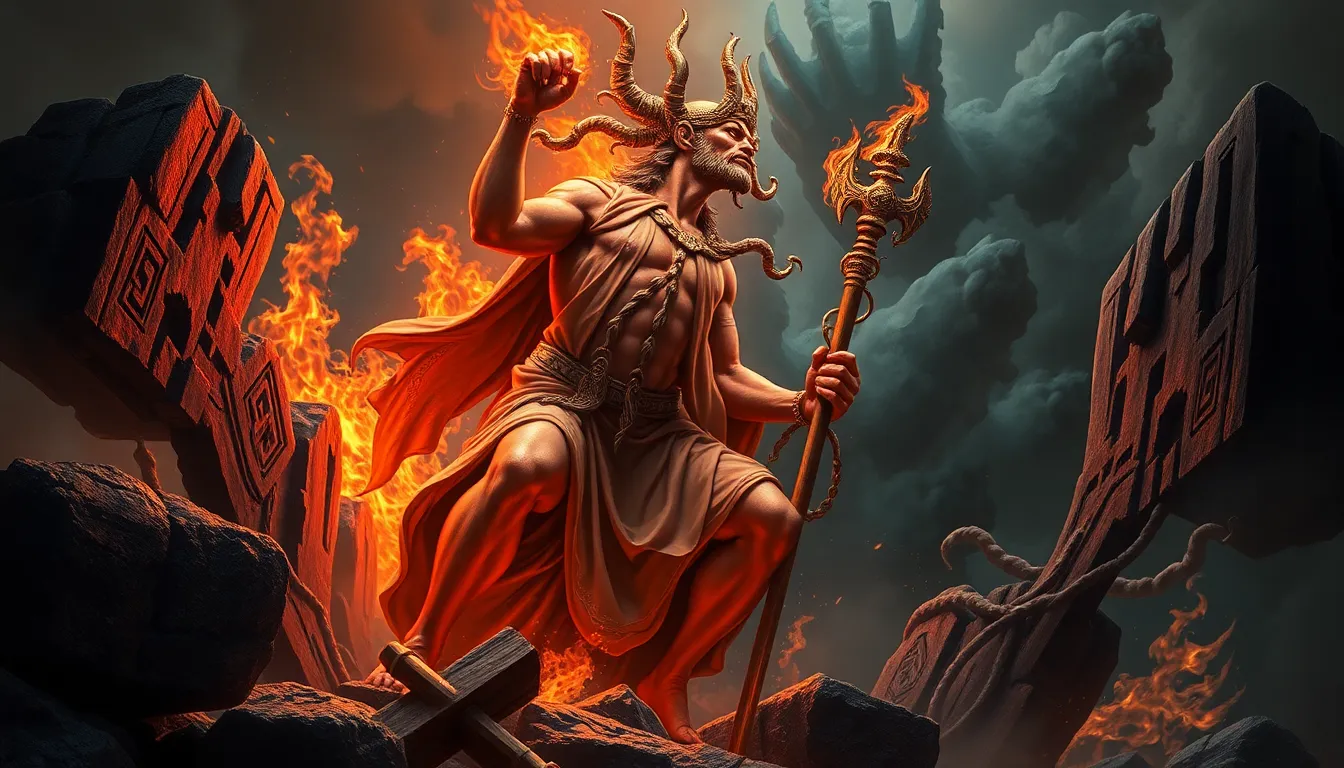The Role of Cronus in the Story of Prometheus
I. Introduction
The myth of Prometheus is one of the most profound tales in Greek mythology, exploring themes of creation, rebellion, and the enduring struggle between gods and mortals. Prometheus, known for his intelligence and foresight, played a pivotal role in the creation of humanity and the subsequent act of stealing fire from the gods to give to mankind. This act of defiance against divine authority set the stage for a dramatic conflict with Zeus, the king of the gods.
At the heart of this narrative lies Cronus, a figure of immense significance in Greek mythology. As a Titan, Cronus not only shaped the world before the Olympians but also influenced the fate of many, including Prometheus. This article aims to delve into Cronus’ role in the narrative of Prometheus, examining the implications of his actions and the broader themes that arise from their relationship.
II. Background on Cronus
Cronus, the youngest of the Titans, was born to Uranus (the sky) and Gaia (the earth). His family lineage is rich and complex, as the Titans were the first generation of deities who preceded the Olympian gods. Cronus’ rise to power came about through a dramatic conflict with his father, Uranus. Displeased with Uranus’ treatment of their offspring, Gaia urged Cronus to overthrow him.
With a sickle forged by Gaia, Cronus castrated Uranus, thus seizing control of the cosmos. This act marked the beginning of Cronus’ reign, often referred to as the Golden Age, a time characterized by peace, prosperity, and the absence of war. Under Cronus, the world thrived as he ruled with a seemingly benevolent hand.
III. The Titanomachy: Cronus’ Downfall
The Golden Age was not to last, as Cronus’ reign came to a catastrophic end during the Titanomachy, a great war between the Titans and the Olympian gods led by Zeus. Fearing that his own children would overthrow him as he had done to Uranus, Cronus swallowed each of his offspring upon their birth. However, his wife, Rhea, managed to save their youngest son, Zeus, by hiding him in a cave and giving Cronus a stone wrapped in swaddling clothes instead.
Zeus grew up in secrecy and eventually led a rebellion against Cronus and the Titans. The Titanomachy was a fierce conflict that lasted for ten years, with the Olympians ultimately triumphing. Cronus’ downfall and the subsequent victory of Zeus marked a significant shift in power, leading to the establishment of the Olympian order and the end of the Titans’ reign.
IV. Prometheus: The Titan of Forethought
Prometheus, whose name means “forethought,” is often depicted as a clever and benevolent figure. He is credited with shaping humanity from clay and instilling them with the fire of intellect and creativity. Unlike many Titans who sided with Cronus, Prometheus took a different path—one marked by compassion for humanity and a willingness to challenge the established order.
The relationship between Prometheus and Cronus is somewhat ambiguous. As a Titan, Prometheus was part of the same generation that Cronus ruled, yet his actions often placed him at odds with the divine hierarchy. While Cronus represented the old order, Prometheus symbolized a new, rebellious spirit that sought to empower humanity.
V. Cronus’ Influence on Prometheus’ Actions
The impact of Cronus’ rule on Prometheus’ decision-making cannot be understated. Cronus’ authoritarian nature and fear of being overthrown created a tense atmosphere in which Prometheus felt compelled to act against the status quo. By stealing fire from the gods, Prometheus not only defied Zeus but also symbolically rebelled against Cronus’ legacy of tyranny.
This act of rebellion reflects broader themes of defiance and fate within their relationship:
- Defiance: Prometheus’ theft of fire was a direct challenge to the divine order established by Cronus and perpetuated by Zeus.
- Fate: Both figures grapple with the consequences of their choices—Cronus with his fear of being overthrown and Prometheus with the punishment he faces for his actions.
VI. The Punishment of Prometheus
Prometheus’ defiance did not go unpunished. After stealing fire and giving it to humanity, Zeus condemned him to eternal torment, having him bound to a rock where an eagle would eat his liver every day, only for it to regenerate each night. This punishment reflects the harsh consequences of challenging divine authority.
Cronus’ indirect role in Prometheus’ punishment is notable. By establishing a legacy of fear and control, Cronus set the stage for Zeus’ ruthless approach to governance. The punishment of Prometheus symbolizes the broader theme of authority and the often cruel consequences faced by those who dare to defy it.
VII. Thematic Connections between Cronus and Prometheus
The stories of Cronus and Prometheus are rich with thematic connections:
- Creation and Destruction: While Prometheus is a figure of creation and enlightenment through his gift of fire, Cronus embodies destruction through his violent rise to power and tyrannical rule.
- Power Dynamics: The tension between Cronus and Prometheus highlights the shifting dynamics of power in Greek mythology, where authority can lead to both oppression and rebellion.
- Lessons Learned: The narratives surrounding Cronus and Prometheus serve as cautionary tales about the consequences of power, the importance of foresight, and the enduring human spirit in the face of tyranny.
VIII. Conclusion
Cronus’ role in shaping the narrative of Prometheus is pivotal. His rise and fall, along with the establishment of Zeus as the new order, created a backdrop against which Prometheus’ story unfolds. The interplay between these two figures illustrates the complexities of power, rebellion, and the enduring struggle for freedom in Greek mythology.
Ultimately, the legacy of Cronus and Prometheus teaches us valuable lessons about authority, the consequences of defiance, and the importance of hope and creativity in the face of adversity. Their stories continue to resonate, reminding us of the timeless human quest for knowledge and the courage to challenge the status quo.




